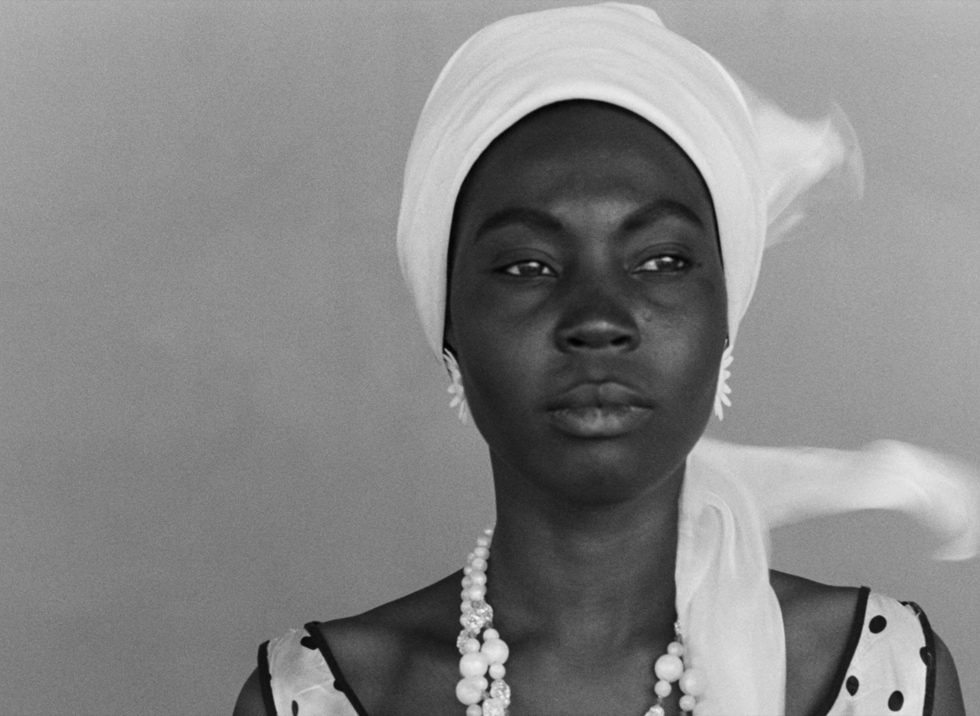
BY MATTHEW ENG |
Ousmane Sembène's BLACK GIRL is One of the Year's Most Important Cinematic Events
A landmark African film finds its way back into the spotlight.

This month, the Directors Guild of America published a bizarre list, culled from its members, of the eighty best-directed films of all time, which included one woman (that’d be Oscar winner Kathryn Bigelow for The Hurt Locker) and only a handful of foreign directors and filmmakers of color, alongside such dubious populist entires as Forrest Gump, The Shawshank Redemption, and, um, Avatar.
Among the scant collection of international auteurs included on this seemingly incomplete list are all the usual masters one would expect: Kurosawa, Fellini, Bertolucci, De Sica, and the like.
Notably missing altogether from this list are any directors of African descent, a suspicious but not entirely surprising omission when one considers that the most publicized filmic depictions of Africa tend to come in pretty productions that are unmistakably Hollywood-made in that they all sport glossy visuals, syrupy messages, and predominantly white casts. If the first image that comes to mind when you hear the term “African cinema” is Robert Redford washing Meryl Streep’s tresses or Kim Basinger gawking at elephants or Leonardo DiCaprio ripping through the wilderness, then you absolutely owe it to yourself as a global audience member to become better acquainted with the much richer cinematic outings that homegrown African cinema has to offer.

Ousmane Sembène is a name that, by all means, should be uttered in the same breath as Kurosawa, Fellini, Bertolucci, and De Sica. Known to most as the “father of African film,” Sembène is almost inarguably the most essential African director of all time and yet his tremendous, groundbreaking legacy is still a foreign entity to even some of the most ardent and highbrow cinephiles, despite vocal admiration from such celluloid titans as Martin Scorsese.
Such unfamiliarity might hopefully change with the release of Janus Films’ crisp 4K restoration of Sembène’s most seminal effort, Black Girl (1966), which opens Wednesday, May 18, for a one-week run at BAMcinématek before opening in more arthouses around the country. Praised considerably enough in its time to become the first crossover African film, Black Girl remains the national classic most recognized by modern filmgoers, a slyly funny and wondrously succinct steel trap of a character study that bolsters a straightforward story to indelibly blistering effect. Mbissine Thérèse Diop, for whom Black Girl would mark both a screen debut and unknowing farewell, stars as Diouana, a young, bright-eyed Senegalese woman who moves to France to become a housemaid for a prosperous white family, only to unravel at the blithe and constant exploitation of her servantry from both her cruel mistress and passive master.
Through contemporary eyes, the static shots and urban milieus of Black Girl seem to solidify Sembène’s filmmaking as an aesthetic neighbor to the emotionally-walloping neorealism of the Italian De Sica. Black Girl may not evoke the immediate adoration of something as universally beloved as De Sica’s Bicycle Thieves, although the latter film’s deft interweaving of personal-is-political social commentary with the rueful, everyday messiness of the lives of the marginalized working class began a storytelling tradition that is gloriously carried on by Sembène. Black Girl has all the skillful stylistic simplicity of your typical piece of neorealism but also packs a sharper bite and it’s electrifying to watch Sembène craft a twisty drama with the piano-chord tautness of a thriller that is nonetheless coated in such a rare and wryly intimate form of humanity.

In his feature debut, Sembène, who died in 2007 at the age of eighty-four, was already proving himself as a killer satirist whose scathing critiques are only matched by the inherent poignancy of his characters. Black Girl’s Diouana is undone by the pressures of many competing and intersecting forces: whiteness, femininity, poverty, national identity. But Diouana is never just a victimized symbol of her circumstances, even though her character’s downward spiral inevitably evokes a much larger and purposeful allegory about black personhood and white guilt. A clumsier filmmaker could probably have made these same points, but Sembène thrives even more so in comfortably embedding audiences within the precarious and occasionally elliptical psychologies of his melancholic characters so that we are drawn to their harsh plights for their larger, provocative import but also deeply moved by the sheer tragedy of their occurrence.
In the same month that the Cannes Film Festival’s distinguished competition lineup plays out on the global stage with not a single African film on the roster, there isn’t a cinematic event this month more timely or imperative than the return of Black Girl. I hope its revival inspires audiences to see what else lies in Sembène’s impressive canon and also check out the works of his most immediate moviemaking progeny, like the excellent Abderrahmane Sissako, director of the remarkable political tale Bamako and the recently Oscar-nominated tour de force Timbuktu.
But first and foremost there is Black Girl, which also screens with a Sembène gem that’s both less known and somehow even more majestic. In Borom sarret (1963), Sembène makes his cinematic debut and paints an astonishing, self-reflexive character portrait of a down-on-his-luck waggoner with a patriarchal complex through plaintively profound vignettes that altogether run just twenty minutes. (It’s worth noting that at a combined length of only eighty-five minutes, this double feature is hardly time-consuming.)

Like Black Girl, Borom sarret is a clever and compelling cinematic experience that retrieves insights both funny and forlorn from several of life’s most unexpected episodes. When viewed together, you can see the full and fierce extent of Sembène’s incomparable talents, as well as an inviting entryway into the multitudinous national cinema that this rare genius helped foster. It’s an entryway that leads to an entire world of undiscovered and underappreciated cinematic riches that are simply waiting for a wider audience willing to watch and appreciate them, if only we care to look.
Black Girl opens at BAMcinématek on Wednesday, May 18, before embarking on a nationwide run in the coming weeks.

